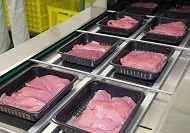May 14 2019
Humans’ love for meat could be hurting the planet. Many of the steps involved in the meat supply chain result in greenhouse gas emissions. But a new international study in ACS’ Environmental Science & Technology evaluates several strategies that could reduce these environmental effects.
 Scientists identified ways to reduce greenhouse gas emissions in the meat supply chain. (Credit: branislavpudar/Shutterstock.com)
Scientists identified ways to reduce greenhouse gas emissions in the meat supply chain. (Credit: branislavpudar/Shutterstock.com)
European Union meat production grew almost 16 percent between 1990 and 2016, while consumption rose 13 percent, according to the Organisation for Economic Co-operation and Development and the Food and Agriculture Organization of the United Nations. This growth has placed a burden on the environment, because meat production results in more greenhouse gas emissions and requires more natural resources including land, water and energy, compared with grain-based food production. Using Germany as a test case, Gang Liu and colleagues examined the entire meat supply chain to weigh the impact of various environmental mitigation strategies on greenhouse gas emissions.
Reducing meat consumption would cut emissions the most, they determined. Eating more parts of the animal — from “nose to tail”— would also have a significant benefit. Emissions could additionally be curbed by eliminating meat waste in retailing and in homes and restaurants, and by finding uses for slaughtering and processing byproducts. Combining all strategies the researchers studied would reduce greenhouse gas emissions from the meat supply chain by 43 percent compared to 2016 levels. They say their findings could inform future policy-making related to climate change mitigation of the animal production and meat processing sector.